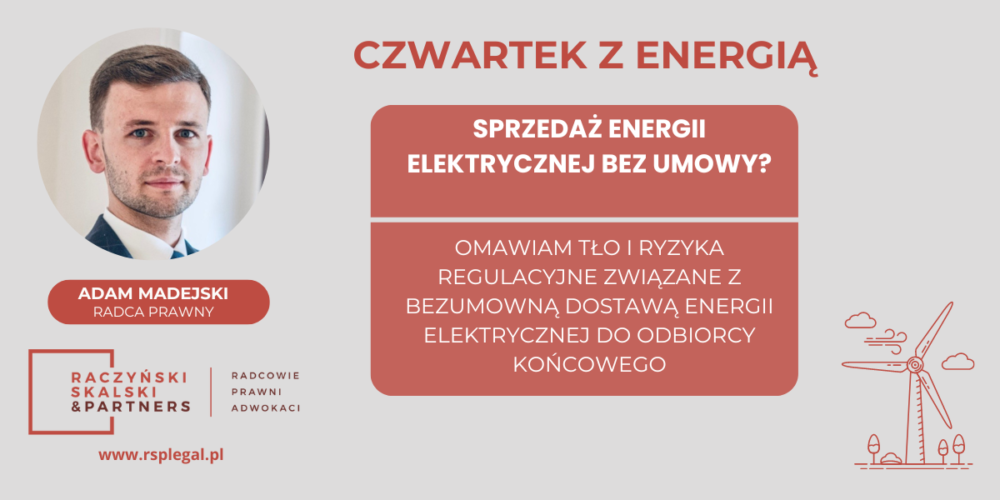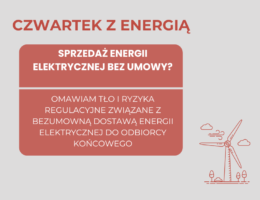The provisions of the Energy Law regulate the sale of electricity in quite some detail, including the requirements for contracts between sellers and end users. Although Article 5(1) of the Energy Law does not explicitly state that a sales contract should be concluded in writing, such a conclusion can be drawn from other provisions of the law, for example, Article 5(2), Article 5(4a)-(4e). This raises the question of whether electricity supply can be carried out without a sales contract?
1. Regulatory background
Although it is physically possible to carry out electricity supply without a contract, such a condition will not be legal and should end in stopping the supply. However, in practice, it is possible that as a result of errors in the process of managing the sales contract (termination of the contract, change of seller) from a legal point of view, the contract will expire, but supplies will continue to be carried out. What regulatory and contractual consequences may be associated with such a situation?
In the first instance, under the standby sales model, which is still in effect, if the incumbent seller has stopped supplying and the end customer has not entered into a new contract, sales are made through a standby seller (Article 5aa of the Energy Law). However, if the end customer has not designated a standby seller in the contract with the selected seller, or if for other reasons it is not possible for the standby seller to make deliveries, deliveries are made by the seller of last resort (Article 5ab of the Energy Law). However, it is worth noting the key phrase used in the provision of Article 5aa of the Energy Law – cessation of supply by the selected seller. Thus, if a situation arises where the contract has been concluded for a fixed period, the parties have not decided to continue their cooperation, and for some reason (e.g., human error) there has been no notification of the expiration of the contract to the distribution system operator and the supplies are still being made, it would have to be considered that there are no grounds for triggering a standby sale.
On a systemic basis, it seems that the above conclusion is not correct, as it would allow the sale of electricity without a contract, in particular without set conditions – a necessary requirement from the point of view of the regulation of Article 5 of the Energy Law. The correct action in such a situation should therefore be:
-
-
- initiate a standby sale – if the parties definitively see no possibility of further cooperation, or
- to conclude a new agreement that also covers the past period.
-
Depending on the facts, the priority for the parties is either to maintain the continuity of the relationship or to immediately settle the formal situation with the distribution network operator.
2. Risks and consequences
For both parties, a situation in which there is a non-contractual supply of electricity creates significant risks.
From the perspective of the end user, first of all, there is the risk of being considered that illegal consumption of electricity is taking place – according to Article 3(18) of the Energy Law, this is a state in which electricity is consumed without a contract or in violation of metering rules. Moreover, as is accepted in the case law, such a condition does not depend on the fault of the end user and is an objective circumstance (so the Supreme Court in the judgments II CSK 489/07 and I CKN 252/01). The discovery of illegal energy consumption may result in the suspension of electricity supply (Article 6b(1)(1) of the Energy Law).
Another risk for the end customer is to switch to a standby sale, the price terms of which are much more unfavorable than regular sales. Even a short duration of reserve sales can negatively and significantly affect the end user’s finances.
Greater problems from a regulatory perspective may await a seller who conducts electricity supply without a contract with the end customer. If the “abandonment” of the end-user occurs in the course of the seller switching procedure as a result of the new seller’s actions or omissions, such a state of affairs is an administrative tort, described in Article 56(1)(16a) of the Energy Law, punishable by a fine of not less than PLN 10,000 and not more than 15% of the income generated from the licensed business.
Conducting deliveries without a contract can also give rise to further regulatory and contractual consequences. First, a final customer who has suffered damage due to the omissions or actions of a trading company regarding the management of a sales contract may seek compensation from that company. Second, the non-contractual supply of electricity may be considered a violation of the conditions for the performance of the license, and consequently a failure to meet the requirement of providing guarantees for the proper performance of the licensed business. As a rule, one of the conditions of the concession is to perform the activity in accordance with the law, respecting the rights and interests of the end users. All of these aspects may be subject to inspection by the Energy Regulatory Office as part of an investigation under Article 28 of the Energy Law. If a seller is found to be repeatedly negligent in properly carrying out its obligations regarding the execution and management of contracts, it may further expose itself to regulatory liability for violating the collective interests of consumers.
With the entry into force of the Central Energy Market Information System and the new model of reserve sales, it seems that the described problem of “abandoned” end users will disappear or be drastically reduced. This is because according to the new wording of Article 5ac of the Energy Law, which will come into force on July 1, 2025: If information about the conclusion of an electricity sales contract or a comprehensive contract for a given energy point of a customer connected to the power distribution network has not been transmitted to the central energy market information system, the energy market information operator shall immediately inform the standby seller of electricity. Thus, if the current sales contract expires in the system, and no new contract is registered, then the standby sales will automatically start.



